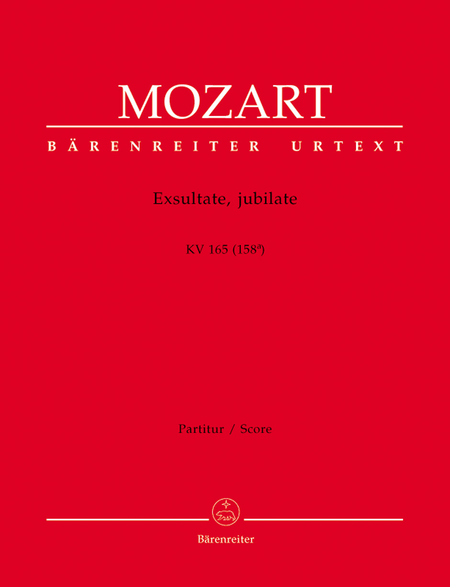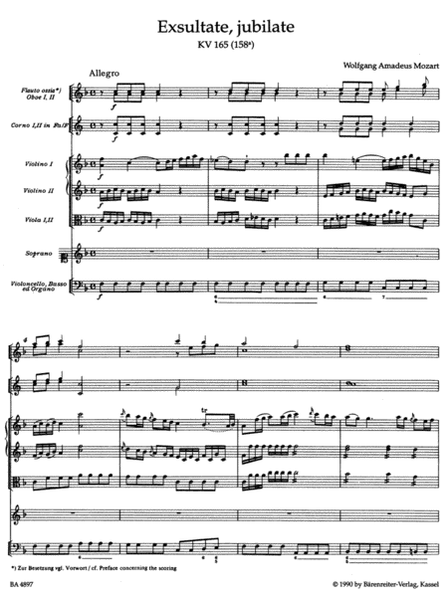Exsultate, jubilate K. 165 (158a)
Motet
-
Ships in 1 to 2 weeks
Details
Description
SKU: BA.BA04897
Motet. Composed by Wolfgang Amadeus Mozart. Edited by Hellmut Federhofer and Robert Münster. This edition: urtext edition. Stapled. Barenreiter Urtext. Sacred, Motetten, Klassik (Motets, Classical). Score. K. 165 (158a). Duration 17 minutes. Baerenreiter Verlag #BA04897. Published by Baerenreiter Verlag (BA.BA04897).ISBN 9790006459933. 31 x 24.3 cm inches.
“In Italy nowadays this term (motet) is applied to a Latin sacred solo cantata consisting of two arias and two recitatives, concluding with an Hallelujah, and sung during the Mass following the Credo, generally by one of the best singers.” One composition matching this description is the solo motet Exsultate, jubilate, K. 165/158a, which Mozart wrote in Milan early in 1773 following the highly successful performance of his opera Lucio Silla.
In 1978, when the music manuscripts in Bavaria were being sorted and cataloged in a project sponsored by the Deutsche Forschungsgemeinschaft, a set of manuscript parts for a previously unknown second version was discovered in the town parish church of St. Jakob in Wasserburg am Inn. The music and text of the concluding Alleluja movement were written out by the Salzburg court bassoonist and copyist Joseph Richard Estlinger (c. 1720–1791), who frequently worked for Mozart and his father.
The vocal text of this Salzburg manuscript departs from that of the Milan version in the first aria and in the recitative. It was entered in a different hand. The Salzburg version of the text is clearly related to the feast of the Holy Trinity. There is much evidence that this version was sung for the first time in the Dreifaltigkeitskirche on 30 May 1779 (i. e. Trinity Sunday) by the Salzburg male soprano Francesco Ceccarelli during a service mentioned by Nannerl Mozart. On that day Leopold and Wolfgang Mozart, together with Ceccarelli, were invited to the church’s vicarage at midday. The additional text underlaying of the first aria enabled the solo motet to be employed for the Christmas service as well.
About Barenreiter Urtext
What can I expect from a Barenreiter Urtext edition?
MUSICOLOGICALLY SOUND
- A reliable musical text based on all available sources
- A description of the sources
- Information on the genesis and history of the work
- Valuable notes on performance practice
- Includes an introduction with critical commentary explaining source discrepancies and editorial decisions
... AND PRACTICAL
- Page-turns, fold-out pages, and cues where you need them
- A well-presented layout and a user-friendly format
- Excellent print quality
- Superior paper and binding


 Share
Share